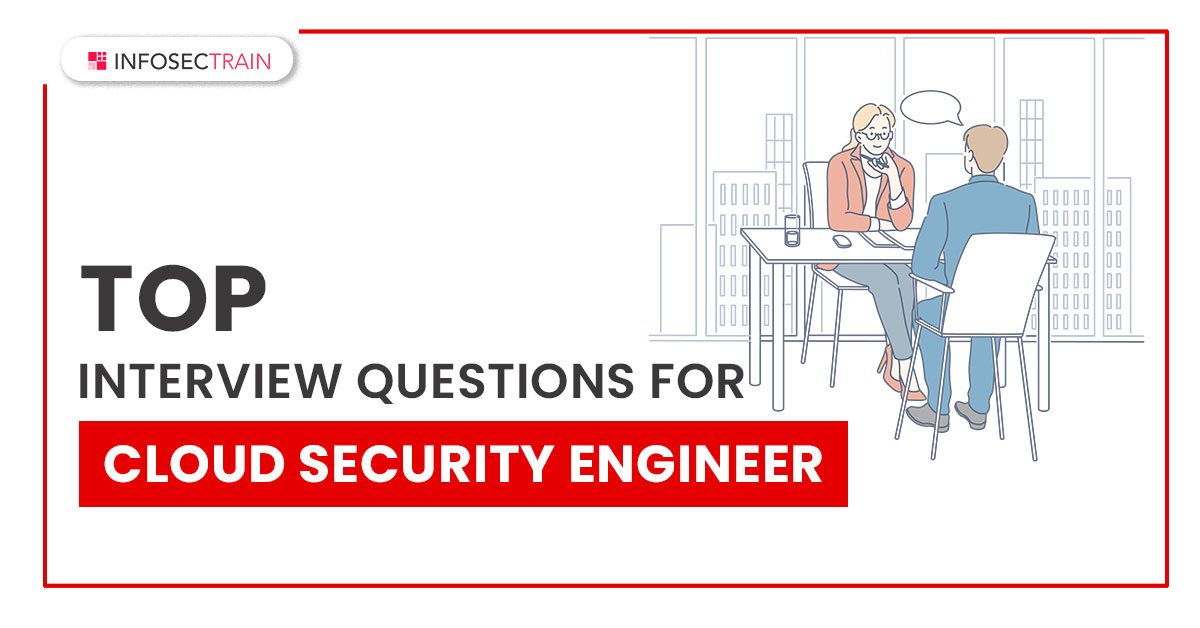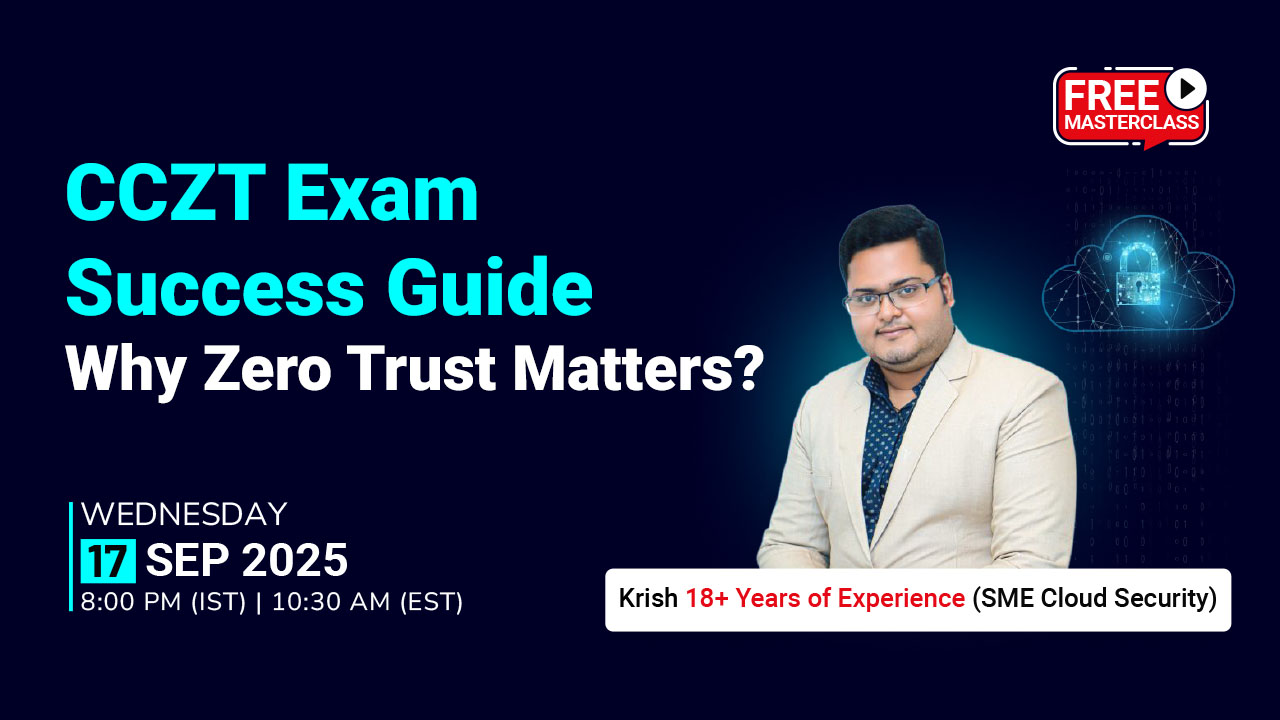Top Interview Questions for Cloud Security Engineer
Cloud security is the protection against cloud-related threats or attacks. It is a primary priority for every company embarking on digital transformation to cloud technology in this new digital world. Today businesses frequently use the terms digital transformation and cloud migration. As enterprises migrate to the cloud for their operations and data storage, security must be considered.

Cloud security refers to all techniques, technologies, and practices to secure and safeguard cloud-hosted applications and data, and Cloud Security Engineers are the ones who are setting up those technologies and strategies. They are the ones who discover where cloud technology is insecure and how to mitigate such weaknesses.
However, as the demand for security expertise develops in the business, the interviews get increasingly tricky. Here are some of the most relevant Cloud Security Engineer interview questions and answers.
1. Describe the IaaS, PaaS, and SaaS models.
IaaS: Infrastructure-as-a-Service or IaaS lets you create cloud-based infrastructure (servers, networks, and so on) in the cloud. Like on-premises, but without the complexity of data centers or infrastructure.
PaaS: Platform-as-a-Service or PaaS allows you to develop software on a cloud-based platform without worrying about infrastructure deployment. Less stress regarding OS/Hardware, but the greater power is given to the vendor.
SaaS: Software-as-a-Service or SaaS is a concept where the provider manages practically everything, and you only use the service, such as Office 365 or DropBox.
2. What are the main characteristics of cloud computing?
The key characteristics of cloud computing are as follows:
- Scalability
- Elasticity
- Identified interfaces
- Paying for self-service usage
- Provisioning at your own
- Easy de-provision of resources once the task is complete
3. Mention the various cloud computing data centers.
Cloud computing data centers include the following:
- Containerized data center
- Low-density data center
4. What exactly is cloud architecture?
Cloud architecture refers to the cloud computing components and subcomponents. The most typical of these components are a front-end platform, back-end platforms, cloud-based delivery, and a network; cloud architecture is made up of these aspects.
5. What are the components of cloud computing architecture?
The following are some of the primary components of cloud computing architecture:
- Management software
- Hypervisor
- Deployment software
- Cloud server
- Network
- Cloud storage
6. What is scalability in the cloud?
The capacity to increase or reduce IT resources as necessary to meet increasing or decreasing demand is referred to as scalability in cloud computing. It is one of the cloud’s defining features and the key driver of its growing popularity among enterprises.
7. What are the various levels that make up cloud architecture?
Cloud architecture is divided into five layers, as follows:
- Cloud Controller (CLC)
- Storage Controller (SC)
- Node Controller (NC)
- Cluster Controller
- Walrus
8. How can you keep your data safe when transferred to the cloud?
The data must be encrypted, and it should be ensured that data is not leaked while moving to the cloud to safeguard data while migrating to the cloud.
9. What exactly is ‘EUCALYPTUS’?
EUCALYPTUS is the abbreviation for Elastic Utility Computing Architecture for Linking Your Programs. It is commonly used in the cloud computing platform to implement clusters to establish public, hybrid, and private clouds.
10. What role does API play in cloud services?
API stands for Application Programming Interface. It is a critical component of cloud platforms. It is employed in the following contexts:
- It specifies how one or more programs should communicate with one another.
- It enables us to use cloud services.
- It facilitates the building of applications and the integration of cloud services with other platforms.
- It also reduces the need to write entire programs.
11. What role does the performance cloud play in cloud computing?
The performance cloud enables the fastest possible data transfer. It is commonly used by experts involved in high-performance computing development.
12. What is Amazon SQS?
Amazon SQS messages are utilized between Amazon components to connect with various connectors. As a result, Amazon SQS can be described as a communicator.
13. What role does buffer play in Amazon Web Services (AWS)?
A buffer is used to improve system efficiency in traffic or load. It assists in the coordination of several components. The buffer maintains the harmony between those components while also causing them to work at the same speed to complete the operation faster.
14. What exactly is a systems integrator?
A systems integrator in cloud computing is a person or firm who specializes in compacting component subsystems and ensuring that they work together.
15. Define geo-targeting in CloudFront.
Geo-targeting is a framework that enables organizations to show personalized information to their audiences based on their geographical location without changing the URL. This allows you to produce customized content for a particular geographical area’s audience while keeping their demands in mind.
16. What stages are involved in implementing a CloudFormation Solution?
Following are the steps:
- Build a different CloudFormation framework or reuse an existing one in JSON or YAML format.
- Save the code to an S3 bucket that will be a storage for the code.
- To access the container and build a layer on your framework, use AWS CloudFormation.
- CloudFormation examines the file, identifies the resources that are called, their order, and the relationships between them, and then provisions the services one by one.
17. What are the benefits of Azure Autoscaling?
Autoscaling is a feature of Azure that allows automatic scaling. Autoscaling assists in managing changing market conditions in cloud services, mobile services, Virtual Machines (VMs), and websites. Here are a few of its benefits:
- Improves application performance
- In response to demand, scale up or down
- Exceptionally cost-effective
18. In Azure SQL, what is Federation?
SQL Azure Federation is a set of tools that allow programmers to access and share datasets in SQL Azure. For scalability, Azure SQL has implemented Federation. It aids administrators by facilitating data division and redistribution and data scaling. It also assists developers with the routing layer and data clustering and facilitates routing without causing application downtime.
- It allows users to access information hosted in the cloud.
- Users can create their databases or exchange databases with one another.
- It minimizes the probability of a single point of failure.
- It saves costs by only using cloud resources when they are needed.
19. Is there a substitute for the console for logging into the cloud environment?
The following are some resources that can assist you with logging into AWS resources:
- Putty
- AWS CLI for Linux
- AWS CLI for Windows
- AWS CLI for Windows CMD
- AWS SDK
- Eclipse
20. Describe a DDoS attack and how it can be mitigated.
DDoS is a type of cyber-attack in which the offender visits a website and creates several sessions to prevent authorized customers from using the service. The following native tools can assist you in preventing DDoS attacks on your AWS services:
- AWS Shield
- AWS WAF
- Amazon Route53
- Amazon CloudFront
- ELB
- VPC
Become a Cloud Security Engineer with InfosecTrain
When you are ready to pursue a career as a Cloud Security Engineer, these questions will help you prepare for your interview. They are not the only questions you will be asked during an interview; the difficulty level will vary depending on the company you are applying for the position. InfosecTrain is ready to assist you with your career as a Cloud Security Engineer. Enroll in our Certified Cloud Security Engineer (CCSE) online training course today to improve your knowledge and skills.







 1800-843-7890 (India)
1800-843-7890 (India)